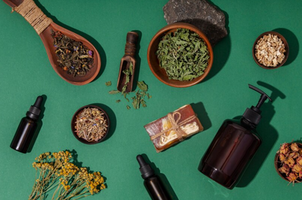
Food is one of the basic requirements to stay alive, but relishing favourite meals with our loved ones is altogether a celebration that is truly a satisfying experience in life. However, the digestive process that occurs after meals is not always smooth. GERD, or Gastro-Esophageal Reflux Disease, is one of the most common digestive disorders in people of all ages. GERD is a chronic condition in which excessive stomach acids flow backwards into the food pipe, i.e. the esophagus, due to weakened or constricted stomach valve structures known as the lower esophageal sphincter, causing heartburn.
Ayurveda defines GERD as "Amlapitta," which means that the Pitta dosha component of the body that regulates digestion has excess acidic levels, resulting in acid reflux and heartburn - Hrit Daha - as well as a bitter taste in the mouth - Tikta Udgara - and indigestion - Avipaka. As the concentrations of acids in the gastrointestinal tract remain high, the Kapha and Vata doshas are hampered, causing additional discomforting symptoms such as nausea, vomiting, bad breath/halitosis, chest pain, and difficulty swallowing food, known as dysphagia.
There are numerous natural solutions available to treat GERD and alleviate the uneasy symptoms in the gastric tract, thanks to the tonnes of information documented in the ancient Ayurvedic manuscripts of Charaka Samhita, Sushruta Samhita, and Ashtanga Hridaya. These powerful herbs balance the Pitta dosha, reduce acid levels in the stomach and oesophagus, and aid digestion.
Proven Simple Ayurvedic Remedies to treat GERD
Pippali
Pippali, also known as Long Pepper, is a tried-and-true herbal remedy for acid reflux and GERD. To relieve heartburn, the spice contains potent compounds that stimulate digestion and balance the Pitta doshas in the system.
To effectively treat GERD symptoms, combine 1 tsp pippali powder with a bit of honey in a glass of warm water and drink the decoction after meals.
Tulsi
Tulsi, also known as Holy Basil, is an excellent natural remedy for a variety of stomach problems, including GERD. The leaves of this sacred plant contain volatile oils that have strong carminative properties and can help relieve flatulence, gas, and hyperacidity.
Sip a cup of hot tulsi tea after a full meal at breakfast, lunch, or dinner to aid digestion and soothe burning sensations in the gut.
Elaichi
Cardamom, also known as elaichi, is high in B vitamins and antioxidants, which help to boost metabolism and facilitate digestion. The aromatic pods also help reduce nausea, bloating, and a bitter taste in the mouth, which are common symptoms of GERD.
Chew on some elaichi/cardamom pods after eating to activate the digestive juices and aid in proper nutrient assimilation within the system.
Ash Gourd
Ash gourd is a nutritious green vegetable that is high in water content and high in phytonutrients such as terpenes and flavonoids, which help to reduce acid levels in the gut and prevent nausea, vomiting, and constipation.
To effectively manage GERD, drink a glass of ash gourd juice in the morning to help with digestion, acid reflux, and heartburn.
Aloe Vera
Aloe vera, also known as Ghrit Kumari in Ayurvedic terminology, is a wonderful panacea for a variety of health conditions, including GERD. The aloe plant's leaves secrete a liquid gel rich in antioxidant and anti-inflammatory compounds that neutralise stomach acids, heal peptic ulcers, and relieve heartburn.
A glass of aloe vera juice with meals improves digestion and treats acid reflux and GERD, resulting in better gut health.
Diet & Lifestyle changes to keep GERD at bay
It is critical to make necessary dietary and lifestyle changes as part of GERD Ayurvedic treatment.
In advanced and chronic cases, diet changes, lifestyle changes, Ayurvedic herbal medicines, and Panchakarma therapies ensure complete GERD cure.
Tea, coffee, aerated cold drinks, processed and fermented foods, fast food, pickles, sour, spicy, salty foods, tobacco, alcohol, and mental stress will all aggravate GERD symptoms. Such things should be avoided by a patient.
To recover from GERD, a patient should drink plenty of water, eat natural, healthy, and easily digestible foods, eat on time, eat fruits and vegetables, exercise regularly, practise yoga, and get enough sleep.
Panchakarma to cure GERD
Panchakarma is a cleansing and rejuvenating treatment that is used to bring harmony between body and mind to lead a healthy life. According to Ayurvedic principles, each human being is a unique phenomenon manifested by the five basic elements of Ether, Air, Fire, Water, and Earth. These elements combine to form three doshas (tridoshas): Vata, Pitta, and Kapha, and their balance are unique to each individual. When this balance is disrupted, it results in disorder and disease. Panchakarma is performed individually for each person, taking into account their specific constitution and disorder, so it necessitates close observation and supervision.
Panchakarma therapies such as virechana and vamana are recommended for chronic hyperacidity patients based on their severity. Yoga and meditation are highly effective stress-reduction techniques that are recommended in all cases. This is an important part of the protocol because one of the major causes of hyperacidity is stress.
GERD can be cured completely with small changes in lifestyle and with the help of right Ayurvedic medicinesprescribed by specialists. At Ayurveda Living, we can help you deal your GERD symptoms at your convenience. Talk to our Ayurveda specialist now!
Note: The information in this article is intended for your educational use only and is not a substitute for professional medical advice, diagnosis, or treatment. Always seek the advice of your physician or other qualified health providers with any questions you may have regarding a medical condition and before undertaking any diet, supplement, fitness, or other health programs.





